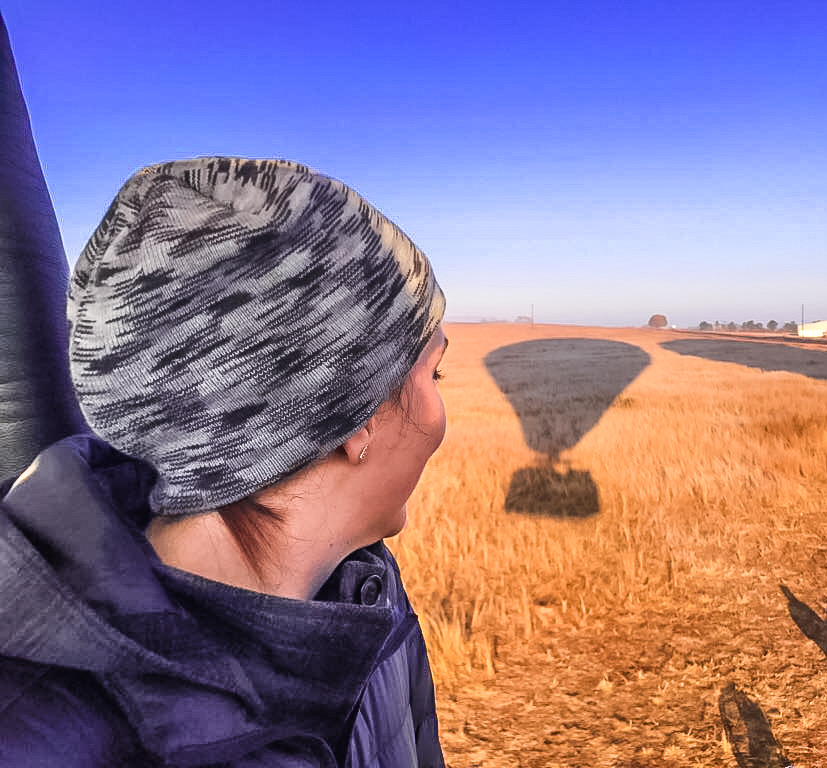





I always jokingly say that my husband wins the prize for the person who can most confidently go in the wrong direction. It often resulted in arguments when we had to get somewhere, as even though he admitted to having a terrible sense of direction, he would assertively walk or drive in a direction without asking if I knew which way was right. I have learned that the worst thing to do in that situation is to try to argue with him about which way is the right way, and so I let him realise on his own that he is going the wrong way. Getting lost can lead to great entertainment when we are travelling and navigating a foreign city, but it’s less amusing when we must be on time for an appointment. I know men don’t like to ask for directions, but I’ve never ceased to be amazed that he never doubts himself, not even a little bit, to consider that I might know the way.

The smartest people are constantly revising their understanding, reconsidering a problem they thought they’d already solved – Jeff Bezos
I sometimes wonder what gives people the confidence to believe so unwaveringly in themselves that they don’t have an inkling of doubt in the back of their minds – something that makes them ask: what if I’m wrong? what if there’s another way of doing it? My dad used to say to me, “Don’t have the I-know-disease. You don’t know everything, so listen to other people and learn. It’s ok to ask others when you don’t know. You don’t have to pretend to know everything.” People are generally incapable of being critical of their own opinions or beliefs. This is not only evident when discussing the right or fastest way to get somewhere, but also in other emotionally charged topics, such as politics or religion. Often, these topics bring out the worst in people, as people are almost militant about their beliefs. Not only do people believe that their way is the only way, but they also feel an obligation to convince others that they are wrong and help them see the right side.

Your assumptions are your windows on the world. Scrub them off every once in a while, or the light won’t come in – Alan Alda
These conversations about complex issues, which invariably turn into heated debates, I wonder how people can be so convinced that they are right. Do people never consider that they might have it wrong, or only partially right? During discussions about religion, the believers deem the atheists, who support evolution rather than the concept of Creation, evil. In the same vein, atheists consider any person who entertains the idea of a life after death a loon indoctrinated by the church. Unwavering faith is at the core of religion, so it becomes easy for believers to consider themselves on the right side and condemn those who do not align with their beliefs to eternal misery. Atheists, on the other hand, are quick to point out that religion is not based on fact. However, despite all the assumptions made about evolution (let’s be honest, no one was there to witness the Big Bang), the idea that the wonderful world of which we are discovering more about every day might include a spiritual realm is implausible. Equally ridiculous theories, assumptions and opinions are the foundations from which both atheists and believers argue. Yet, the two opposing sides never stop to consider that the other side might have truth behind it.

The more I learn, the more I realise how much I don’t know – Albert Einstein
World politics is often a topic of discussion around the operating table – the latest developments in the war between Russia and Ukraine, or what is happening in Palestine. With the recent escalation of conflict between Israel and Palestine, every South African was expected to take a side. Our president adorned himself with a Palestinian keffiyeh to show his support. During one of these political debates, I asked by a show of hands who had been to Israel or Palestine. Of course, no one raised their hand. I resolved to say that perhaps one should not be so convinced of one’s standpoint on who is in the wrong, as one doesn’t understand the full context. When my brother and I argued, luckily it was far from causing a world war, my Mom refused to take a side and would say, “It takes two to tango”. There are always two sides to the story. Professor Kevin Behrens says that he finds it disturbing that when responding to ethical, religious, and political conflicts, many people are absolutely sure that their side is entirely right, and that the other side is entirely wrong. People are so sure that they label those who don’t fully agree with them as enablers of terrorism, supporters of genocide, enablers of a new Russian imperialism, puppets of NATO and Ukraine nazis. A position taken by many is that you are either 100% for us or against us. Knowing that what one chooses to believe is made against the uncertainty of the facts is a reason for one to be more humble about one’s choices, less dogmatic in one’s stance and open to being persuaded differently.
Remember, there are always two sides to every story. Understanding is a three-edged sword. Your side, their side and the truth in the middle – J Michael
The world is becoming more progressive, and it is the norm to discuss controversial topics around the dinner table. While the fundamental human right of freedom of belief, opinion, and expression is more prominent than ever, people are also increasingly being judged and openly criticised. Astonishingly, it is often the progressives who judge so harshly if someone does not support their progressive beliefs. One of the buzz phrases today is “my truth”. What people using this don’t know is that one can be admitted to a psychiatric institution for uttering these words. I am reminded of a patient I met in the chronic psychiatric ward during my psychiatry rotation in medical school. I wanted to consult with him before reading his file, as I wanted to ensure an unbiased diagnosis. We had a general discussion about life, he was informed and orientated, and it seemed like he didn’t belong there. I was about to write my recommendation that he should be discharged immediately when he started talking about his hand that is ruling his body from another world. That was his truth, but reading his file, I confirmed that he was completely delusional for years.
One must recognise that there is a difference between facts and opinions – facts can be objectively verified as true or false, and one’s morals and beliefs shape opinions. Just because one believes something does not make it true. A study from Harvard University found that people were more likely to perceive an opinion as a fact when they agreed with it, and a fact as an opinion when it didn’t align with their beliefs. It is often said that we live in a post-truth age. Professor Behrens says that today, facts have lost their currency. It is not that the truth does not exist, but that facts have become secondary to our points of view. I will never forget the patient from my psychiatry rotation, as after our consultation, I decided to never believe so firmly in something that I cause myself harm and always to be open to the idea that when other people say my hand is not ruling my body from another world, they might be right.

It is a narrow mind which cannot look at a subject from various points of view – George Elliot
A while back, my husband shared his thoughts on an article he read that resonated with him. It was about a study that uncovered the one personality trait linked to intelligence. The author, Jeff Haden, writes that he has a friend who believes that smart people are more unhappy than less intelligent people because they are more critical, have higher standards, and are therefore more prone to failure – all things that ultimately lead to unhappiness. But Haden writes that science has proven his friend wrong. Studies have shown that happiness is highest in high IQ groups, and that lower IQ groups are less happy due to lower income and socioeconomic disadvantage. The bottom line is that to become happier, one needs to become more intelligent. The study in Haden’s article has shown that the only personality trait associated with intelligence is openness. Openness is not about telling everyone around you what you are about, but rather it is a willingness to explore, not only new experiences, but also to entertain new ideas, other points of view, and information. Being open means that one must be less sure that one is right or that one’s way is the only way – to be more tolerant of ambiguity, more willing to talk less and listen more. By increasing one’s open-mindedness, one can become more intelligent. “I still think it easier to be happy when you are unintelligent”, my husband mumbled. I thought that my husband’s response proved Haden’s point spectacularly. One must be open-minded enough to entertain the idea that there are different definitions of happiness. What is happiness? Some would say that if a person smiles all day, others might think they are happy when they are challenged and stimulated, or when they are loved. Only if one changes one’s view of what happiness is does the article make sense.
The measure of intelligence is the ability to change – Albert Einstein
Jennifer Wright argues that humility is the foundation of a virtuous life. She writes that humility is necessary because self-centeredness is a natural part of what it means to be human. This innate self-centeredness distorts our ability to see the world as it really is. Humility is a state of awareness where this distortion is quieted. She explains that humility reduces the gravitational pull of one’s values, beliefs and goals, so one can hold them more loosely. Humility enables one to evaluate oneself accurately, be more open to revision, and more accepting of and less threatened by one’s fallibility and imperfection. Only then does it no longer feel catastrophic to be wrong and becomes less important to be right.
True humility is staying teachable, regardless of how much you know – John Wooden
Frank Zappa said,” A mind is like a parachute. It doesn’t work if it is not open”. No one will jump out of a plane with a parachute that is not going to open, so why do people go through life with a closed mind? People should have greater humanity and less intolerance of alternative viewpoints. One should allow for a little bit of doubt in the back of one’s mind. If it doesn’t make one more intelligent, it will definitely make the world a more humane and interesting place.
